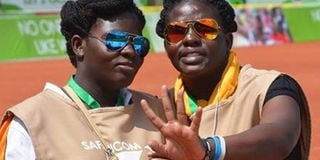Prime
The mystery that is twins

Parents today consider giving birth to twins a blessing very few can get. Courtesy photos
The birth of twins today is considered a blessing but not much is done to celebrate them. But in traditional Africa, even here in Uganda, giving birth to twins was never taken as a normal feat.
In some communities, they were regarded as a true blessing from the gods, while in others, they were curse-babies only seen as a bad spell. A number of beliefs, myths and traditions surrounded the arrival of twins, some of which are still recognised to date.
Twenty four-year-old John Mark Waiswa and his twin brother Daniel Tenywa have had a fair share of the stereotypes that people associate twins with. Luckily for them though, the Basoga have always appreciated twins and treated them as a blessing. “The attention has receded as we have got older. But as children we were always given special treatment.
Things always got a little out of hand whenever we visited our grandmother back in Kamuli. The people there treated us almost as demi gods.” Tenywa says before Waiswa adds: “Some would even ask us to pray for them so that they could also have twins, or to simply bless them.”
This is not surprising, considering that twins were in some communities, notably among the Baganda and Basoga considered spiritual. Madina Nabuso, 59, a resident of Ndejje, Wakiso District notes that originally, twins were believed to bless people.
“People would in fact pray to the twins to bless them, especially women facing fertility issues. They would ask the mother of the twins who (Nnalongo) to ask her twins to pray for them,” Nabuso says.
Welcoming the twins
Among the Baganda, the arrival of twins called for a special ceremony named, okuzina abalongo. Nabisere says: “The father of the twins would climb a tree in his own father’s compound and shout in all four directions, announcing that they have received a twin birth. The entire community then came around to welcome the twins.”
Okuzina abalongo was always characterised with vulgar songs rich with puns and sometimes punctuated with obscenities, perhaps the only time elderly Baganda were licensed to spew obscenities and often in the presence of in-laws, also called abako.
“Actually, the parents were even allowed to dance with their in-laws which is otherwise considered taboo. The father of twins and the mother-in-law would dance together and sometimes engage in fake fights where both families would join in. Food and alcohol would be served, animals sacrificed and the twins named,” Nabuso says.
Naming
The twins were given specific names in different communities.
Norah Tukamushaba, 47, says the rightful naming of twins was one of the traditions that had to be done right or else curses would befall the family. Just like the Baganda, a ceremony had to be held to welcome the twins among the Banyankore.
“All the other community members who came to the ceremony were required to drink juice made from the ‘omwetango’ plant (chenopodiaceous). Otherwise if you touched the newborn twins without drinking the plant juice, your skin would suffer from ‘ibuga’ - the loss of skin pigmentation causing bleaching. The twins would burn you!” Tukamushaba says.
The Banyole, however, did not invite everyone to the ceremony. Only clan members were invited and when a woman bore boy twins, two spears were put outside the house on the right side but for the case of girls, they would place two pot supporters made from banana leaves, known as ‘engaraa’. One did not have to inquire about the sex of the twins but only study the items placed outside the house and know.
The curse babies
Much as twins were a blessing in many communities, other traditions regarded them a curse. In some denominations of the Luhya including the Bukusu and Samia, some believed that twins had to be killed or taken to faraway communities and not raised by their parents.
Alex Wanyama, 54, says the move to take twins far away from the parents was to protect the parents as it was believed that twins could easily kill off one of their own parents.
“They were taken to a distant good friend and brought back at a later age when it was regarded safe to have them back to the compound. But among the Bukusu and sometimes the Samia, one of the twins and mostly the younger one would be killed. He or she was regarded a curse that only came along with the elder twin that was regarded the real baby.”
And most communities, including the Baganda, twins were considered immortal and thus could not die. Their death was called “okubuka,” which meant that the twins would just fly away. And when they do fly and are buried, which must be so far away from the homestead, their bodies do not decompose but turn and remain white forever!




